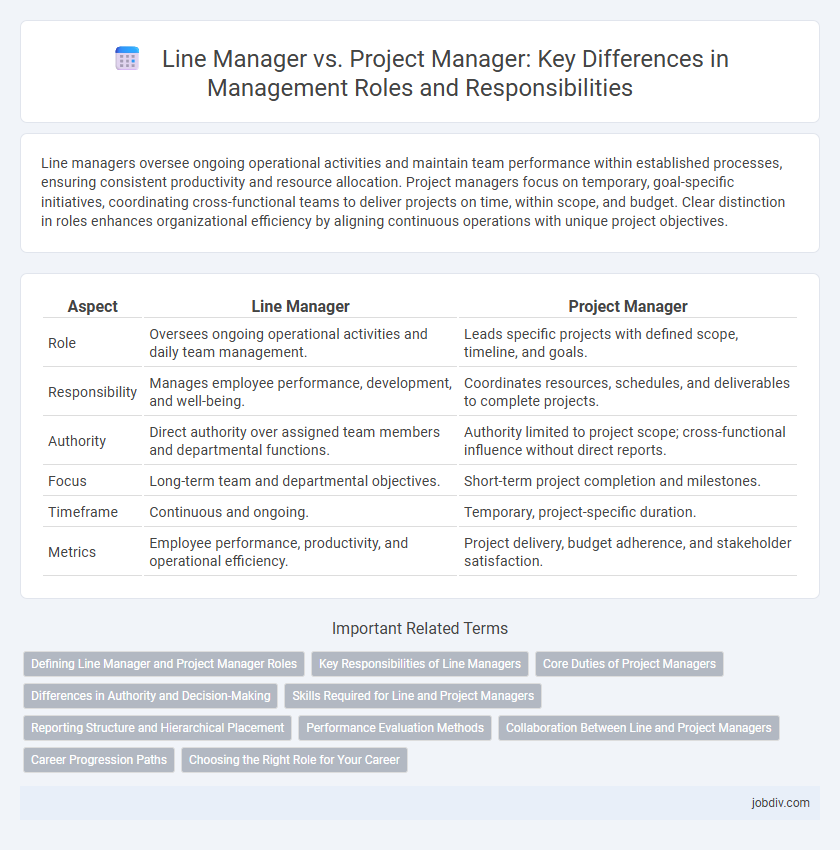Line managers oversee ongoing operational activities and maintain team performance within established processes, ensuring consistent productivity and resource allocation. Project managers focus on temporary, goal-specific initiatives, coordinating cross-functional teams to deliver projects on time, within scope, and budget. Clear distinction in roles enhances organizational efficiency by aligning continuous operations with unique project objectives.
Table of Comparison
| Aspect | Line Manager | Project Manager |
|---|---|---|
| Role | Oversees ongoing operational activities and daily team management. | Leads specific projects with defined scope, timeline, and goals. |
| Responsibility | Manages employee performance, development, and well-being. | Coordinates resources, schedules, and deliverables to complete projects. |
| Authority | Direct authority over assigned team members and departmental functions. | Authority limited to project scope; cross-functional influence without direct reports. |
| Focus | Long-term team and departmental objectives. | Short-term project completion and milestones. |
| Timeframe | Continuous and ongoing. | Temporary, project-specific duration. |
| Metrics | Employee performance, productivity, and operational efficiency. | Project delivery, budget adherence, and stakeholder satisfaction. |
Defining Line Manager and Project Manager Roles
Line managers oversee ongoing operational activities, directly managing teams, facilitating daily tasks, and ensuring employee performance aligns with organizational goals. Project managers coordinate specific projects with defined scopes, timelines, and budgets, focusing on delivering project objectives while managing cross-functional teams. Both roles require leadership skills but differ in their scope, duration, and strategic impact within an organization.
Key Responsibilities of Line Managers
Line managers oversee day-to-day operational tasks, manage team performance, and ensure adherence to organizational policies. They handle employee development through coaching, performance evaluations, and resource allocation within their functional areas. Their key responsibilities emphasize maintaining operational efficiency and aligning team activities with long-term organizational goals.
Core Duties of Project Managers
Project managers oversee project planning, execution, and delivery, ensuring objectives align with organizational goals and stakeholder expectations. They coordinate resources, manage timelines, and mitigate risks to maintain project scope, budget, and quality standards. Unlike line managers who supervise ongoing operational teams, project managers lead cross-functional teams focused on temporary, goal-specific initiatives.
Differences in Authority and Decision-Making
Line managers hold formal authority over their team members and are responsible for day-to-day supervision, performance evaluations, and resource allocation within a department. Project managers have authority specifically over the project's scope, timeline, and deliverables but lack direct control over team members' long-term employment or departmental resources. Decision-making by line managers typically focuses on operational efficiency and staff management, whereas project managers make strategic decisions to meet project objectives and ensure timely completion.
Skills Required for Line and Project Managers
Line managers require strong interpersonal skills, operational expertise, and team leadership abilities to effectively manage daily workforce activities and ensure smooth business operations. Project managers need advanced skills in project planning, risk management, and cross-functional coordination to deliver projects on time, within scope, and budget. Both roles demand excellent communication and problem-solving capabilities, but project managers emphasize adaptability to changing project dynamics while line managers focus on consistent team performance and resource management.
Reporting Structure and Hierarchical Placement
Line managers directly oversee employees within a specific department and report to higher-level functional managers, establishing a clear vertical reporting structure aligned with the organizational hierarchy. Project managers operate across departments, coordinating teams temporarily and typically report to a program manager or a project management office (PMO), reflecting a matrix or horizontal reporting structure. The hierarchical placement of line managers is embedded within the departmental chain of command, while project managers hold a cross-functional role with authority tied to project scope rather than permanent organizational rank.
Performance Evaluation Methods
Line managers typically use ongoing performance evaluations based on daily task completion, direct supervision, and long-term employee development aligned with organizational goals. Project managers emphasize milestone reviews, deliverable assessments, and cross-functional team feedback to measure success within specific project scopes and timelines. Both approaches integrate qualitative and quantitative metrics but differ in their focus on continuous employee growth versus project outcome achievement.
Collaboration Between Line and Project Managers
Effective collaboration between line managers and project managers enhances resource allocation and ensures alignment between operational goals and project objectives. Clear communication channels and defined responsibilities reduce conflicts and improve teamwork, fostering a cohesive work environment. Integrating performance metrics from both management roles drives productivity and supports successful project delivery within organizational structures.
Career Progression Paths
Line managers typically advance by deepening expertise within a specific department, often moving toward senior operational roles such as department head or director. Project managers progress through managing increasingly complex projects, leading to roles like Program Manager or Portfolio Manager, which require broader strategic oversight. Career growth in both paths benefits from mastering leadership skills, but line managers focus more on functional leadership while project managers emphasize cross-functional collaboration.
Choosing the Right Role for Your Career
Selecting the right role between a Line Manager and a Project Manager depends on your career goals and leadership style; Line Managers focus on ongoing team management and operational efficiency within a department, while Project Managers specialize in driving specific projects to completion with defined scopes and timelines. Understanding the distinct responsibilities, such as Line Managers handling performance appraisals and resource allocation versus Project Managers managing budgets, risks, and stakeholder communication, is crucial for aligning your skill set with the role. Prioritizing roles that match your aptitude for routine leadership or dynamic problem-solving enhances long-term career growth in management.
Line Manager vs Project Manager Infographic

 jobdiv.com
jobdiv.com